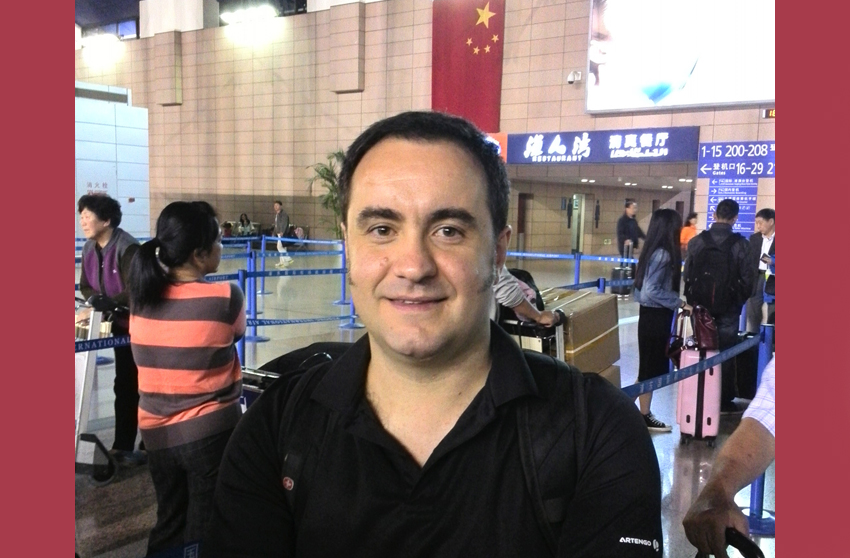Joseba Etxarri. It’s the new Basque emigration, or one of them, that of young professionals who travel in order to implement new Basque businesses in Mexico, Brazil, Chile, India or China. Izotz Aldana studied Powder Metallurgy at the Markina Politechnic and did his internship at the PMG Polmetasa in Arrasate-Mondragon, where he ended up working. When they, after a while, announced the opening of a new line of production in Shanghai, he had no doubts. He has been in Shanghai a little more than four years and so far he feels comfortable.
-How is your Chinese?
-In the factory we normally speak English. We are 170 people and the only westerners are the manager and I, but the Chinese who live in the city and who have done advanced studies usually speak English. Our employees are young people and they fit this profile. By age, I’m one of the oldest in the factory.
-What do you make?
We produce components for automobile shock absorbers. They are mainly sold on the Asian market, mainly in China.
-That is a big jump to go from Gernika or Arrasate to Shanghai.
The first three months were very hard for me, I'd walk back home. Solitude is hard, you come and start a business from scratch and you know that you have support, you talk via videoconference, but you can’t avoid feeling isolated. Today I feel comfortable.
-What did your family say when you told them you were going to work in China?
They encouraged me. My father is from Gernika and my mom from Bermeo, but dad used to be a professional pelotari playing jai-alai and so living outside of Euskadi is part of our history. As an anecdote, even though I am from Gernika, I was born in Indonesia in Jakarta, when my father played Jai-Alai. We were there for two years, and then later moved to Florida, Orlando, two more years and then we returned to Gernika. Dad still gets together with the friends he met at the frontons in Asia and America. The last time was two years ago, when nearly 30 of them got together.
-What shocked you the most in China?
Everything is very different. Even if Shanghai isn’t exactly China. It is a very modern city, with 24 million inhabitants, the financial center of the country. It is full of contrasts. When I landed I remember that I saw many bikes and Chinese cars that look to me strange, something I had never seen before, and along with those Ferraris and high-end cards, that I hadn’t seen before either. The customs are different: some of ours for them are lack of manners and vice versa. I use my hands a lot when I talk and that is looked down upon here. Or if you are meeting with your boss and you get a call, it’s normal here to answer and start a conversation. It's also true that the western culture is invading the youth here more and more.
-What is it like to live there?
It’s pretty expensive, but it depends. In some central areas in downtown, that welcome more westerners, life is much more expensive than in places that are further away, where only Chinese people live. A beer on the street in Laowai, in downtown, can cost 40-50 Yuan – 8 Yuan make a Euro – and the same beer can cost 10 or 15 or less in a place further away.
-The Euskal Etxea in Shanghai was founded in 2004. You came in 2010 and it took you three years to join.
Initially I didn’t need it. Several expatriates lived on the same block, two engineers, one Austrian and another Canadian, and for a while my boss was here from Arrasate and our manager, a German, who also went back. One day a friend that I studied with told me that he was coming and through him I met Garazi who was the president of the club then and so I started going.
-What is the Shanghaiko Euskal Etxea, the Shanghai Basque club like?
There are 50 members. We have a clubhouse where we organize vents. For example, this Saturday we will celebrate Maritxu Kajoi, the festival of Arrasate-Mondragon; right now we have 75 people signed up, so we will end up in a restaurant. I would say that the Basque club is the result of the efforts and commitment of many people, and maintaining it is very important to us. It is an escape for us, a place that gives us strength and nourishes us, and not just with food. Every year we elect the board and ask for volunteers. When they asked me I said, “Why not?” It is team work and we have a good time, and there are always people ready to take over the following year.






 Send to a friend
Send to a friend Add comment
Add comment








